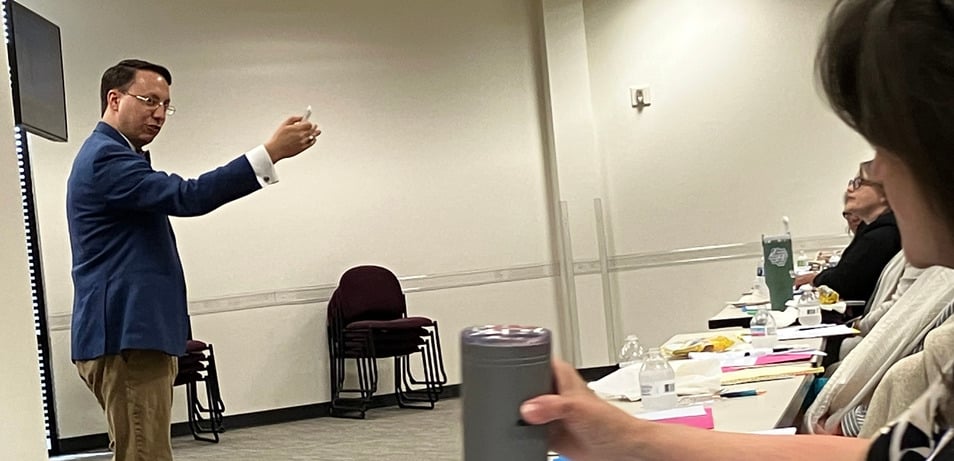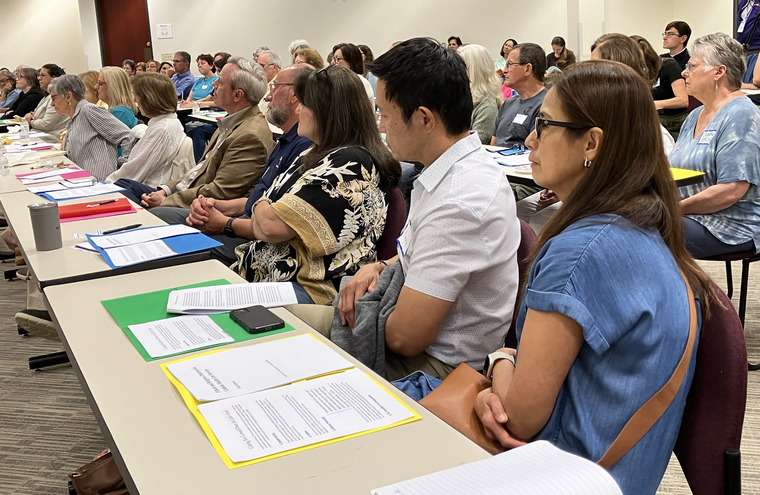Search
Human Dignity Must be Upheld at End-of-Life, Dr. Ragusa Asserts
-
 July 3, 2025Death is not merely a physical cessation of life, but an intersecting of the physical and spiritual realms, according to Catholic teachings. People filled the Westerfield Center in Baton Rouge to find out more about end-of-life issues in a presentation by Dr. Christopher Ragusa.
July 3, 2025Death is not merely a physical cessation of life, but an intersecting of the physical and spiritual realms, according to Catholic teachings. People filled the Westerfield Center in Baton Rouge to find out more about end-of-life issues in a presentation by Dr. Christopher Ragusa.
The Office of Life, Peace, and Justice of the Diocese of Baton Rouge sponsored the program last month.
Ragusa, a professor of moral theology at FranU, highlighted the theological and philosophical concepts of human dignity.
Philosophically, when discussing the value of things, it’s important to distinguish between price, or what something is worth, and dignity. Things with a price can be replaced by an equivalent. Things which are considered priceless cannot be replaced and have dignity. Ragusa emphasized human beings are intrinsically and equally priceless.
Human dominion, as recorded in the book of Genesis, is the authority and responsibility given to humanity to manage and care for the Earth and all its creatures. In light of this truth, it’s important to remember that human beings are not things to be owned but persons to be loved.
“We are not to be, as termed by Pope Francis, a ‘throwaway culture’ of the world, the elderly, the unborn, and the poor,” said Ragusa.
The morality of human actions focuses on what your intention or ultimate end is, or what you are doing it for, according to Ragusa.
In science and the moral life, every action has an equal and opposite reaction, stated Ragusa.
He talked about the double effect principle. The rule of double effect is a moral principle in Roman Catholic moral theology, which says that sometimes it is morally permissible to do an act that has both good and bad outcomes, as long as the intention behind the act is not to bring about either of those outcomes.
This brings up questions: What about complex situations with many effects to my actions? How then do I understand my actions, what I do, choose, and who I am choosing to be? Top right photo: Dr. Ragusa makes points about the priceless value of human life.
Top right photo: Dr. Ragusa makes points about the priceless value of human life.
Above photo: The Westerfield Center was filled with people during a program on end-of-life issues. Photos by Debbie Shelley | The Catholic Commentator
To make the right moral choice one must consider: The object of choice must be good or at least morally neutral; the intention must be good; one must never do evil so that good may come about, and the evil effect must truly be a side effect and not part of the chosen means; and the good effect must be equally or proportionately better than the evil effect.
Dr. Ragus discussed the double principal effect in healthcare ethics, specifically ordinary and extraordinary means of medical treatment. He referred to the United States Conference of Catholic Bishop’s (USCCB’s) Ethical and Religious Directives for Catholic Health Care Services. The USCCB teaches that one has a moral duty to ordinary means of caring for one’s own health but has no duty to extraordinary means.
Generally, ordinary or proportionate means of treatment, in the patient’s judgement, offer a reasonable hope of benefit and do not entail an excessive burden or impose an excessive expense on the family or community. Even if delivered artificially, they include warmth, clothing, cleanliness, nutrition and hydration, and pain management.
Extraordinary means, in the patient’s judgement, do not offer a reasonable hope of benefit, or they entail an excessive burden or impose an excessive expense on the family or community.
These decisions are made by the patient, or his or her family if he or she is unable to do so, Ragusa said.
He highlighted USCCB’s Caring for Loved Ones at Life’s End Document. The USCCB states that caring for dying loved ones includes praying with them; listening to them; being steadfast in compassion and presence; reminiscing – including memories that involve their favorite foods; learning and being informed; and helping them achieve closure.
In talking about euthanasia, Ragusa referred to two different cases. In a Louisiana case, a child with terminal cancer requested that he die without pain. As the child neared the end of his life, he was in such pain that the nurse explained to the parents that they would increase his dosage of anesthesia by small increments, but it would eventually suppress the child’s breathing.
The nurse increased the dosage of the anesthesia until it was past the legal limit for the child’s size, with the unintended result that the child died.
Because the child’s death was unintended, the state board of nursing cleared the nurse of euthanasia, which is illegal in Louisiana.
In another case, in the Netherlands, a 74-year-old woman with Alzheimer’s disease requested she be euthanized when her disease became too severe. When it reached that point, the family called a doctor to euthanize the patient. The doctor slipped a sedative in the patient’s cup of coffee. The sedatives were ineffective, and 40 minutes later the patient became aware of her surroundings and saw the doctor was about to give her a lethal injection. She protested and the doctor asked the family to hold the patient down while she gave her the injection.
The doctor was not charged with a crime because euthanasia is legal in the Netherlands. The Dutch medical complaints board, however, reprimanded the doctor for failing to adequately consult the patient before carrying out the euthanasia, including giving a sedative without her explicit consent.
Dr. Ragusa also covered the two types of death: cardiac/respiratory death and brain death. He discussed the controversy that has ensued over how to test for and diagnose brain death.
He referred to the case of Jahi McMath, a 13-year-old girl who was declared brain dead in 2013. Her family refused to withdraw life support for years. She continued to grow and even went through puberty. Jahi never recovered and eventually died. But her case and others prompted calls to change the law.
In defining death, the Catechism notes that death is the separation of body and soul and cannot be strictly observed by medicine. The soul is also the form and animating principal of the body. (CCC 364-365)
Ragusa concluded by saying death is a tragedy. However, in Jesus we have hope.
“The Lord of Life entered into our humanity and filled everything, even our suffering and death, with his life,” Ragusa said.
To see the video on the presentation visit https://www.youtube.com/watch?v=zPCqhRhocaM.
